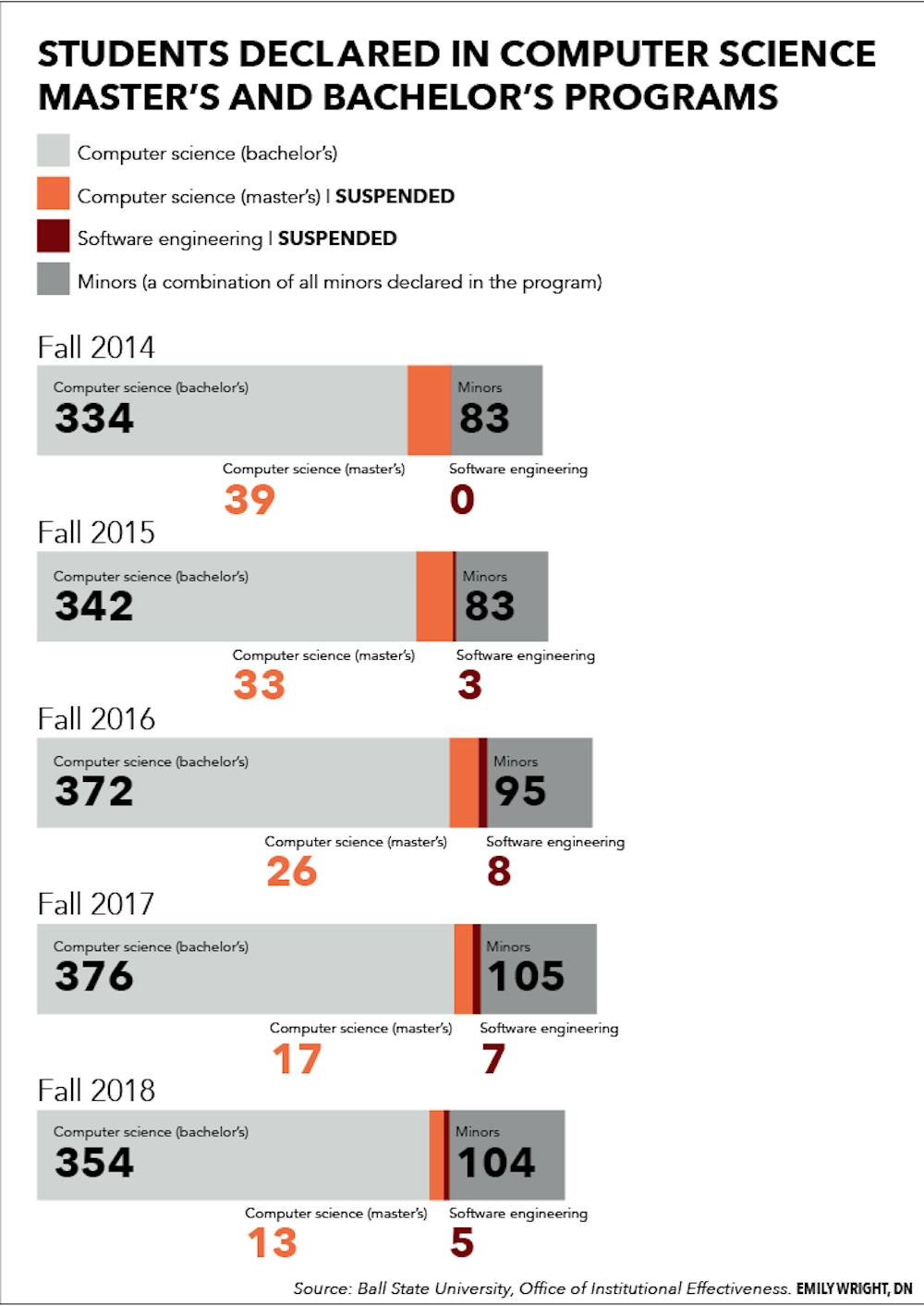Matthew Smith always knew he wanted to work with computers.
“My grandpa got me into computer games for me to play. And that's where it started,” Smith said.
After finishing his undergraduate computer science degree at Trine University in Angola, Indiana, he got a job as a software engineer at Ontario Systems in Muncie.
A year later, he decided to take his education to the next level by attending the computer science and software engineering master’s programs at Ball State, graduating in December 2018. Now, however, both of these programs have undetermined futures.
Ball State is suspending the Department of Computer Science master’s programs, bringing the total number of master’s programs in the department to zero.
The master’s degree in computer science program was suspended March 2019 and the software engineering program was suspended November 2018, said Paul Buis, chairperson of the department of computer science and associate professor of computer science, over email.
He said there was one main reason why both of these programs are suspended: enrollment.
“It surprises me a little in that I’m in the industry now and (it) seems like there’s a lot of jobs open,” Smith said. “Just makes you wonder why people are not interested.”
The department did not have sufficient enrollment to offer the programs without having multiple courses with low enrollment each semester.
Buis said paperwork for the suspension has been sent in to the “uppermost” level of administration to be approved.
Kathy Wolf, vice president of marketing and communications, said over email, “The analysis within the College of Sciences and Humanities has led us to place a hold on new admissions to the computer science programs you mentioned.”
As of April 3, there has been no official announcement indicating the suspension of any of these graduate programs. Wolf said the university doesn’t make public announcements about “internal curricular changes.”
Yaron Ayalon, faculty council chair, said he was not sure about public announcements with the suspension and dropping of courses, but said such matters are the business of departments and colleges.
Wolf also said that across the university, programs are reviewed periodically “to assess which ones are most attuned to the needs of our students.”
According to Ball State’s Office of Institutional Effectiveness, the number of students who declared a master’s in computer science in fall 2014 to fall 2018 dropped from 39 to 13. However, in comparing the number of students that declared a bachelor’s degree in computer science between those years, that number rose from 334 to 354.
“I did notice, as I went on, some classes started to get smaller,” Smith said. “I kind of thought that … may have been because they were the upper level classes.”
By the end of his time in the program, Smith said he was the only one working on a capstone project last fall semester.
According to section 22.1 of Ball State’s "Faculty and Professional Personnel Handbook," the minimum class size is 10 for undergraduate classes and six for graduate classes. Section 22.2 states “each department may offer one under-enrolled class section” with permission from the college dean.
He said the department was given permission to offer two under-enrolled courses each semester for the last two years of these graduate programs, but it did not appear the enrollment would increase before fall 2019.

Buis said for a three-credit hour course in computer science, the class sizes need a larger number of tuition-paying students to break even. He said the majority of students had tuition reductions as part of a graduate assistantship.
“It makes no financial sense to repeatedly offer courses that lose that much money for the university,” Buis said
The department of computer science still offers a bachelor’s degree in computer science and minors in computer science and computer security.
“The undergraduate Computer Science program is still very healthy,” Buis said.
As of April 3, the page for the master’s degree in computer science is still on Ball State’s website, however, the page for the software engineering program was not.
Bob Mattax, a 2003 computer science master’s graduate, said the landscape of the computer science industry has changed, and that in the classroom setting, it’s hard to adapt to the same workplace flow in the industry, which includes projects that are fast paced and “ready to pivot.”
“I just went headfirst into it,” Mattax said. “I learned more on the job than I ever did in the classroom, personally.”
He said the internet has played a large part in making fundamental computer science education affordable and accessible to almost anyone in the past decade who is ambitious enough.
Mattax said the classroom setting can teach students coding languages along with some of the principles and best practices, but unless those things are executed in a real-world environment, it’s still just theory.
“The language is never going to be what makes you a good candidate. It's always going to be your ability to solve problems, it’s always going to be your ability to work within a team, to communicate, to show that you have a passion for those things,” Mattax said.
He said he wouldn’t be surprised to hear other universities’ programs declining in admissions, unless those programs take on huge problems and subjects like artificial intelligence and robotics.
“Unless you have a program that's going to push that and really, you know, tap into that passion piece of people to solve bigger, better, badder, stronger, faster problems, whatever they are,” Mattax said. “There's going to be some atrophy.”
Because of these changes, Mattax said universities need to start adapting and offering more incentives for students to want to spend their money and time at these institutions outside of simply learning the coding languages. He said universities can find those admissions by focusing on team projects, real-world experiences and “marrying” the education with the workforce.
Mattax said he recently piloted a program with Anderson University where they hire and train employees for on-campus jobs doing software engineering with a team at about 20 hours a week, giving them that experience throughout their school work.
Wolf and Buis said current students will be provided the needed classes to graduate. However, Buis said undergraduate students thinking of applying to the graduate programs will need to look elsewhere. Both said no faculty will be fired.
In fact, Buis said he hopes the program will return.
“We would have to demonstrate that we could successfully recruit enough students for the program to be viable,” Buis said.
Contact Andrew Harp with comments at adharp@bsu.edu or on Twitter @adharp24.





